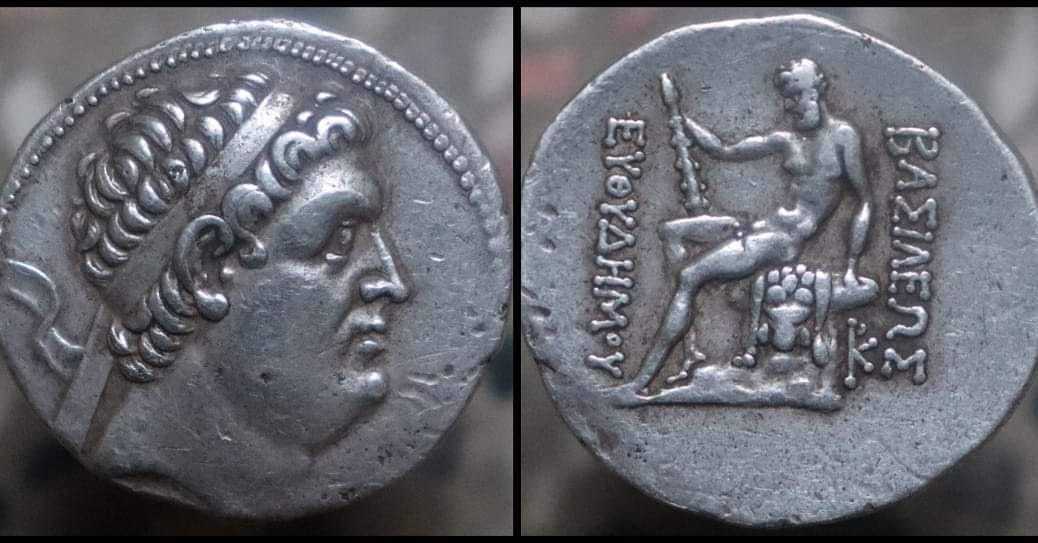
Greco-Bactrian kingdom Euthydemos I, c. 230-200 BC, 16.45 grams, 29mm with perfect 12h Die axis, elderly portraits type, AR Tetradrachm.
Obverse: Diademed head of king facing right, within dotted border.
Reverse: Nude Herakles seated left on a pile of rocks, holding club in right hand which he rests on another pile of rocks, Greek legend: BAΣIΛEΩΣ EYΘYΔHMOY. PK monogram in lower right field.
Euthydemos I was a Greco-Bactrian king in about 230 or 223 BC according to Polybius; he is thought to have originally been a satrap of Sogdiana who overturned the dynasty of Diodotus of Bactria and became a Greco-Bactrian king. Strabo, on the other hand, correlates his accession with internal Seleucid wars in 223–221 BC. His kingdom seems to have been substantial, including probably Sogdiana to the north, and Margiana and Ariana to the south or east of Bactria.
Euthydemos was allegedly a native of Magnesia (though the exact site is unknown), son of the Greek general Apollodotus, born c. 295 BC, who might have been son of Sophytes, and by his marriage to a sister of Diodotus II and daughter of Diodotus I, born c. 250 BC, was the father of Demetrius I according to Strabo and Polybius; he could possibly have had other royal descendants, such as sons Antimachus I, Apollodotus I and Pantaleon.
Little is known of his reign until 208 BC when he was attacked by Antiochus III the Great, whom he tried in vain to resist on the shores of the river Arius (Battle of the Arius), the modern Herirud. Although he commanded 10,000 horsemen, Euthydemos initially lost a battle on the Arius and had to retreat. He then successfully resisted a three-year siege in the fortified city of Bactra, before Antiochus finally decided to recognize the new ruler, and to offer one of his daughters to Euthydemos’s son Demetrius around 206 BC. As part of the peace treaty, Antiochus was given Indian war elephants by Euthydemos.
Classical accounts also relate that Euthydemos negotiated peace with Antiochus III by suggesting that he deserved credit for overthrowing the descendants of the original rebel Diodotus, and that he was protecting Central Asia from nomadic invasions thanks to his defensive efforts:
“…for if he did not yield to this demand, neither of them would be safe: seeing that great hords of Nomads were close at hand, who were a danger to both; and that if they admitted them into the country, it would certainly be utterly barbarised.” (Polybius, 11.34).
The war lasted altogether three years and after the Seleucid army left, the kingdom seems to have recovered quickly from the assault. The death of Euthydemos has been roughly estimated to 200 BC or perhaps 195 BC, and the last years of his reign probably saw the beginnings of the Bactrian incursions into Northern India. (History Source Wikipedia)
We hope we have been helpful to you
Art expert
For you betrayed: Stefan Ivanov Proynov
See more: fakeart.eu






